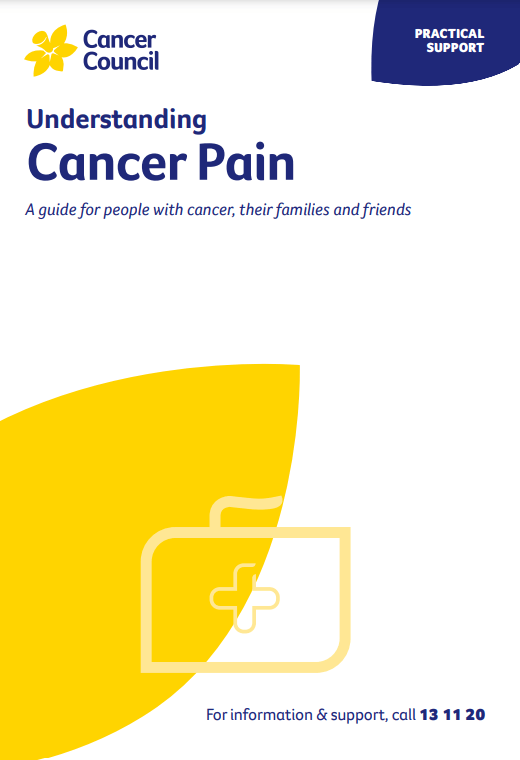- Home
- Cancer Information
- Managing side effects
- Pain and cancer
- Managing pain with medicines
Managing pain with medicines
Medicines used to control mild cancer pain include paracetamol and non-steroidal anti-inflammatory drugs (NSAIDs). They are often available over the counter from pharmacies without a prescription. These types of drugs can help relieve certain types of pain, such as bone pain, muscle pain, and pain in the skin or in the lining of the mouth.
NSAIDs can reduce inflammation or swelling, and be used with stronger pain medicines such as opioids, to help relieve moderate to severe pain.
Learn more about:
Paracetamol
Paracetamol is a common drug that is known by various brand names such as Panadol and Panamax.
It comes in many different formulations. An adult should take no more than 4 g of paracetamol in 24 hours (usually 8 tablets), unless your doctor says it’s safe to do so. For some people, a lower dose of paracetamol is recommended due to low body weight or liver problems. The maximum dose for children depends on their age and weight, so check with the doctor, nurse or pharmacist.
If taken within the recommended dose, paracetamol is unlikely to cause side effects. Some stronger pain medicines contain paracetamol along with another drug, and count towards your daily total intake. Taking too much of one type of medicine may lead to an overdose.
If you are unsure whether a medicine contains paracetamol, check with your doctor, nurse or pharmacist. In some cases, your doctor will recommend you take paracetamol with other stronger pain medicines, such as oxycodone, to help them work better.
Non-steroidal anti-inflammatory drugs
Non-steroidal anti-inflammatory drugs (NSAIDs) are a group of medicines that include ibuprofen, naproxen, celecoxib, diclofenac and aspirin. They are known by various brand names, such as Advil and Nurofen.
You can have these medicines as tablets or sometimes as injections. Less commonly, NSAIDs are given as a suppository. Do not take more than one NSAID medicine at the same time – if you’re unsure, check with your doctor, nurse or pharmacist.
Side effects of NSAIDs
Before taking NSAIDs, ask your doctor if they are suitable for you, as some people are at higher risk of side effects.
Common side effects include:
- nausea
- indigestion.
Rare side effects include a risk of bleeding in the stomach or intestines, and kidney problems. Some studies show that NSAIDs can cause heart problems, especially if used for a long time or in people who have heart problems.
Talk to your doctor or nurse before taking NSAIDs, especially if you have stomach ulcers, heart disease, kidney disease or gut reflux; are having chemotherapy; or are taking other medicines that also increase your risk of bleeding (such as anticoagulants/blood thinners like warfarin). If you are taking NSAIDs in high doses or for a long time, take them with food to lower the risk of indigestion. You can also ask about using a different type of pain medicine that is less likely to cause indigestion and bleeding, such as paracetamol.
To find out more about your pain medicine and possible side effects, read the Consumer Medicine Information included in the box of medicine or ask your pharmacist for a copy.
Podcast: Managing Cancer Pain
Listen now
More resources
Dr Tim Hucker, Pain Medicine Specialist, Peter MacCallum Cancer Centre, VIC; Dr Keiron Bradley, Palliative Care Consultant, Bethesda Health Care, WA; A/Prof Anne Burke, Co-Director Psychology, Central Adelaide Local Health Network, President, Australian Pain Society, Statewide Chronic Pain Clinical Network, SA, School of Psychology, The University of Adelaide, SA; Tumelo Dube, Accredited Pain Physiotherapist, Michael J Cousins Pain Management and Research Centre, Royal North Shore Hospital, NSW; Prof Paul Glare, Chair in Pain Medicine, Palliative Medicine Specialist, Pain Management Research Institute, The University of Sydney, NSW; Andrew Greig, Consumer; Annette Lindley, Consumer; Prof Melanie Lovell, Palliative Care Specialist HammondCare, Sydney Medical School and The University of Technology Sydney, NSW; Caitriona Nienaber, 13 11 20 Consultant, Cancer Council WA; Melanie Proper, Pain Management Specialist Nurse Practitioner, Royal Brisbane and Women’s Hospital, QLD; Dr Alison White, Palliative Medicine Specialist and Director of Hospice and Palliative Care Services, St John of God Health Care, WA.
View the Cancer Council NSW editorial policy.
View all publications or call 13 11 20 for free printed copies.
Need to talk?
Support services
Coping with cancer?
Speak to a health professional or to someone who has been there, or find a support group or forum
Looking for transport, accommodation or home help?
Practical advice and support during and after treatment
Work and cancer
Information for employees, employers and workplaces dealing with cancer
Cancer information
What is cancer?
How cancer starts and spreads
Dealing with the diagnosis
Common reactions to a cancer diagnosis and how to find hope
View our publications
Guides and fact sheets for people with cancer, their families and friends

